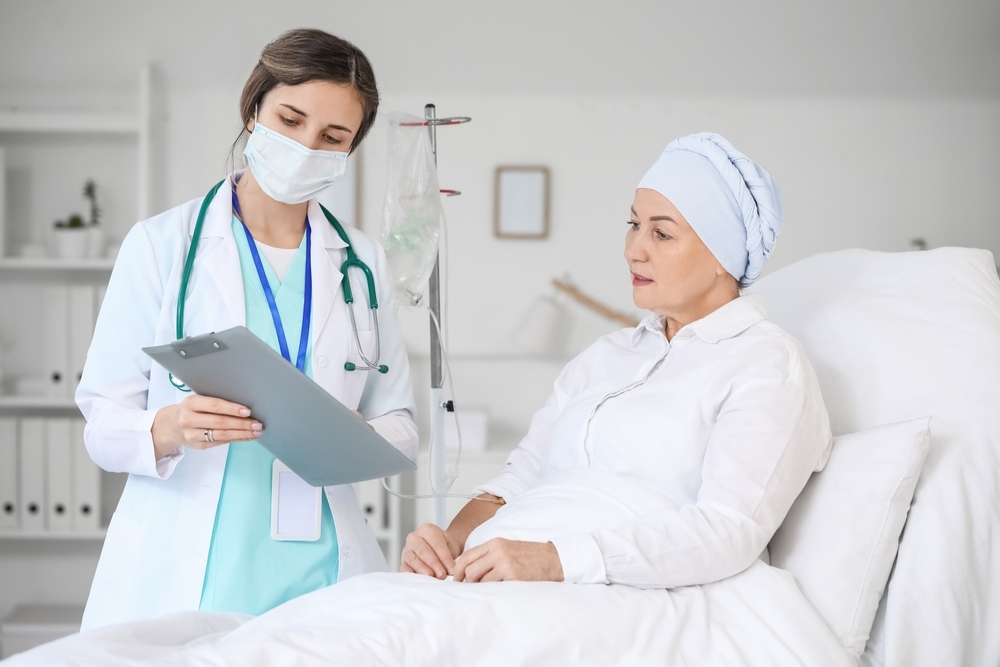
☝️ The most important facts in brief
- Oncology is the medical speciality that deals with the diagnosis and treatment of cancer.
- An oncologist treats patients with a wide variety of cancers. These include both tumours and blood cancers.
- Oncologists work closely with other disciplines, such as haematology and radiology, to ensure the best possible diagnosis and treatment.
- To become an oncologist, you must complete training as a specialist in internal medicine and also successfully complete further training in haematology and oncology.
📖 Table of contents
An oncologist is a doctor who specialises in the diagnosis and treatment of cancer. He deals with the treatment of various types of tumours and provides comprehensive care for cancer patients. Haematology, which deals with diseases of the blood, also plays an important role in oncology. Would you like to find out more about the tasks of an oncologist? Then read on now and find out whether being an oncologist is the right career for you.
Are you interested in studying medicine?
We will be happy to advise you free of charge about your options for studying medicine, including advice on studying medicine in another EU country, which is fully recognised in Germany.
What is oncology?
The term "oncology" comes from the Greek: The word "onkos" means tumour or tumour, and "logos" stands for teaching. Put together, the term therefore refers to the study of tumours. However, not every cancer today is characterised by an "onkos", i.e. a swelling: Blood cancers are characterised by the increased formation of certain cells. Modern oncology, including haemato-oncology, can therefore be described as the study of disturbed cell proliferation.
The aim of an oncologist is to recognise disturbed cell division at an early stage and take the right measures.
What exactly does an oncologist do?
The activities of doctors in oncology can essentially be divided into three areas: Prevention, diagnostics and therapy.
Prevention
Prevention plays an important role in oncology. Patients with risk factors are informed precisely about these risks. The aim of regular screening is to ensure that cancer is recognised at an early stage. In addition to check-ups, a healthy lifestyle, such as avoiding smoking or excessive alcohol consumption, is also an important preventative measure.
As an oncologist, you educate people accordingly and ensure that a disease is recognised in good time during a preventive check-up so that it can still respond well to treatment.
Diagnostics
One of your main areas of responsibility as an oncologist is diagnostics. If there is a suspicion of cancer, it is your job to confirm or disprove this suspicion. You will also determine the stage of the tumour and the exact type of cancer.
In order to make the correct diagnosis, you will have access to various imaging techniques such as CT, MRI and ultrasound in oncology. You will also carry out blood tests and take tissue samples, which are then analysed in the pathology department. Only well-executed diagnostics can ensure that patients receive the best possible care and treatment.
Therapy
After diagnosis, the treatment of tumours and blood cancers is one of your most important tasks as an oncologist. Tumours are often completely or partially removed by surgery.
Chemotherapy disrupts the division of cells. As the cells affected by cancer in particular divide quickly and frequently, this form of therapy is an important part of tumour therapy. Depending on the type and stage of the disease, it is used before surgery to shrink the tumour or afterwards to destroy any tumour cells still present in the body and thus increase the chances of successful cancer treatment.
Radiotherapy can also be used to cure many tumour patients. The areas affected by the cancer are irradiated, which is intended to prevent the development of new tumours from cancer cells remaining in the body.
In addition to the three therapies mentioned above, there are numerous other approaches that are used to treat cancer, depending on the disease. In immunotherapy, for example, the oncologist uses the body's own immune system to fight cancer cells.
Curative and palliative cancer therapy
Curative therapy aims to cure the tumour disease completely. Oncologists aim to remove or destroy all cancer cells. Patients should be able to lead a long-term cancer-free life. Close follow-up care is important in order to recognise a so-called recurrence in good time and to be able to take countermeasures again.
If the cancer is so advanced that doctors can no longer achieve a complete cure, palliative therapy focuses on alleviating and improving the quality of life.
Palliative treatment of tumour diseases does not mean that the patient will always die soon. After all, the word "pallium" can be translated as "cloak" and can be interpreted to mean that the therapy places a protective cloak around the tumour disease so that it causes the patient less suffering and progresses as slowly as possible or even comes to a complete standstill for a while.
Becoming an oncologist - what does it take?
Anyone who wants to become an oncologist has a long training programme ahead of them. First of all, you need to study medicine, followed by further training to become a specialist in internal medicine, haematology and oncology.
The medical degree programme
The medical degree programme usually lasts 6 years and provides students with an in-depth overview of each individual subject and a great deal of knowledge that they will later need as registered doctors. The degree programme is divided into the following 3 parts:
1) Preclinic
The pre-clinical part comprises the first two years of the medical degree programme. In this section, students learn the basics such as anatomy, physiology and biochemistry. They acquire basic knowledge that they can later apply in clinical practice. Initial insights into diagnostics and therapy are also included.
2.) Clinic
The four-year clinical phase follows the pre-clinical phase and lasts four years. In this section, various specialisms are covered for one or more semesters. Oncology is also a topic here for one semester.
The clinic is much more practical than the pre-clinical part. In all departments, there are not only lectures, but also practical sessions. Contact us with patients. In this protected environment, students learn to apply the theoretical knowledge they have learnt.
3) Practical year (PJ)
The practical year is the last stage before the state examination. Here, the future doctors gain practical experience in internal medicine (which also includes oncology), in the Surgery and in a self-selected area. Supervision during this practical part is provided by experienced doctors.
The final major examination, the state examination, takes place after the final year. If you pass this, you are a doctor and can look for an assistant position at a clinic and then start training to become a specialist in haematology, oncology and internal medicine.
Training to become a specialist in internal medicine, haematology and oncology
Training to become a specialist takes at least six years. Trainee oncologists learn to diagnose and treat tumour diseases. They acquire knowledge of chemotherapy, radiotherapy and surgical procedures.
In addition to the treatment of tumour diseases, the training also includes the prevention and aftercare of tumour patients. Trainee oncologists also learn to draw up complex treatment plans, plan chemotherapy and work together with other specialist departments on an interdisciplinary basis. Practical experience is gained through rotations in various clinical departments.
Cancers frequently encountered in oncology
Oncology is a medical field that encompasses many different diseases. To ensure reliable detection and subsequently take the right measures, you need to be familiar with all of them. We will now give you an overview of the most common types of cancer and their specific characteristics.
Breast cancer
Breast cancer is one of the most common tumour diseases in women. It is usually diagnosed by mammography and a subsequent biopsy. Treatment usually consists of surgery to remove the tumour, followed by radiotherapy and chemotherapy.
Under certain circumstances, it may be advisable to remove the entire breast in order to reduce the risk of a recurrence. Regardless of the extent of the operation, regular aftercare is important,

Lung cancer
This common and aggressive tumour disease is often diagnosed by oncologists using X-rays and CT scans. Treatment includes surgery, radiotherapy and chemotherapy.
Regular follow-up care is also crucial here, as relapses are unfortunately not uncommon with lung cancer.
Leukaemia
Leukaemia is a form of blood cancer in which white blood cells multiply uncontrollably. An oncologist diagnoses this cancer of the haematopoietic system through blood tests and bone marrow examinations. While some types of leukaemia occur mainly in children, others mainly affect adults over a certain age.
Blood cancer is usually treated with chemotherapy. In some cases, a stem cell transplant may also be appropriate.
Colorectal cancer
Colorectal cancer is one of the most common tumour diseases and is usually diagnosed by means of a colonoscopy and a tissue sample taken during the procedure. Here too, surgery and subsequent chemotherapy and/or radiotherapy are the treatment methods of choice.
In recent years, science has increasingly focused on the different types of bowel cancer and developed more specific treatment methods - for example using monoclonal antibodies - for this type of tumour.
Prostate cancer
Tumours of the prostate are among the most common cancers in men. The oncologist can diagnose them using so-called PSA tests and biopsies. In many cases, it is also palpable through swelling of the prostate.
Prostate tumours can be treated with surgery, radiotherapy and hormone therapy. Regular follow-up care ensures that the oncologist recognises relapses at an early stage.
Ovarian cancer
Ovarian cancer is a serious tumour disease that is unfortunately often diagnosed late. If the tumour has already spread, it is often not possible to remove all affected parts of the tissue during the operation, as otherwise the risk of bleeding and complications would be too high.
However, science now also has forms of chemotherapy for ovarian cancer that can help the patient and keep the cancer at bay for a long time. However, comprehensive care by medical specialists is necessary for the rest of the patient's life.
An oncologist must be mentally resilient
As an oncologist, you face major challenges every day. Caring for patients with serious tumours requires emotional strength. There are often serious diagnoses to deal with, and although many positive outcomes bring joy to your day-to-day work, unfortunately you also have to tell patients time and again that their cancer is incurable.
As an oncology specialist, you must always keep a cool head in order to plan complex treatments and adapt them to changing situations if necessary.
Ongoing training is mandatory for oncologists
Oncology specialists must regularly undergo further training in order to keep up with the latest scientific developments. New findings, diagnostic methods and therapies are constantly being developed. Only if you are familiar with these and know how to apply them can you provide your patients with the best possible care. A tumour that would have meant certain death just 5 years ago may well be treatable today.
The answer to the question "What is an oncologist?" may change a little over time as new methods and ways of working are added. It is important to be open to these changes.
Oncologists are constantly expanding their knowledge through seminars, congresses and specialised literature. In view of this, the profession requires a constant interest in the latest scientific developments in oncology and a corresponding level of commitment.
If you decide to specialise in oncology, your learning does not stop after graduation, but continues throughout your entire career as a doctor.
Free information material
Studying medicine abroad 🎉
Order your info pack now, find out more about the Studying medicine abroad and get started as a medical student!





